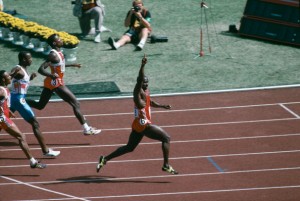Ben Johnson returned to the Jamsil Olympic Stadium in Seoul, South Korea where 25 years ago on Sept. 24, 1988 he won the Olympic 100-meter title in a world record time of 9.79 seconds only to be stripped of his gold medal after testing positive for anabolic steroids.
Johnson stood on the starting line at 1:30 p.m., exactly the same time that he took to the starting blocks on September 24, 1988. He slowly walked toward the finish line at a much more sedate pace than it took him to cover the 100 meters a quarter-of-a-century ago.
The 51-year-old Canadian was returning as part of a worldwide anti-doping campaign, “Choose the Right Track.”
The campaign was organized by sportswear company SKINS. It has already involved stops in London, Toronto, New York, Sydney, Melbourne and Tokyo. Campaign organizers unveiled a scroll petition, signed by 1,000 people, so far, which is slated to be presented to the International Olympic Committee (IOC) and the World Anti-Doping Agency (WADA).

Johnson spoke with Inside the Games sports reporters during the 25th anniversary event. A link to the full interview is below.
On Lance Armstrong’s lifetime ban from cycling for use of performance enhancing drugs: “We are all human beings. We all make mistakes in life. I feel for him. Hopefully, he will overcome the situation, but it’s going to be tough for quite a while. I should know. It’s a situation you have to live with all the time. I wish him the best.”
On his anti-doping campaign #ChooseTheRightTrack: “Every time people talk about a doping positive people talk about Ben Johnson. But now I’m just trying to get the message across. I’m happy I’m doing this, deep down in my heart.”
On why he did performance-enhancing drugs: “Twenty five years ago I knew that other people were doping and I had the decision of whether I should do it or not. I felt like I needed to try and please people in my camp. I felt like most of the athletes I was going to be competing against would be doing the same thing.”
On the fact six of eight 100-meter runners were linked to drugs at the Seoul Olympics: “I do believe that most of the runners in that race were on drugs, and they tested positive over the years. I don’t set the rules in the situation. I am just a guy in a small pond, just trying to survive, so to speak. There was too much politics and too much money involved. Where there’s money, there’s corruption.”
On why he is speaking out against doping: “I did something wrong, and I got punished. Twenty-five years later, I am still being punished for what I did. People who commit murders go to jail and get out. I broke a rule in sports, and I got a nail in the cross. I am trying to send a message that there has got to be a fair game. No mother wants to see her son or daughter go through what I went through for 25 years, because it’s not good mentally and physically.”
On doping today: “When I was doing drugs I knew I wasn’t doing it right. Not a lot has changed in the last 25 years. People are still testing positive for performance-enhancing drugs like they were when I was competing. Twenty five years on, as an older man, I see people making the same mistake. The way it can change is if athletes can have someone to talk to who will tell them the right decision to take.”
On the fight to stop athletes from using drugs: “It’s not just about punishment. You have to light the candle at both ends. You need to be talking to 17-18 year olds who are heading for the Youth Olympics or the junior World Championships. You need to give them information and to get into their minds.This is the way you have to try to stop this generation moving forward in the wrong direction. Athletes have to work together on this. I think it can be done.”
To read the full interview with Johnson click here.
Mike Rowbottom and Duncan Mackay both interviewed Ben Johnson. You can contact Rowbottom at mike.rowbottom@insidethegames.biz and Mackay at duncan.mackay@insidethegames.biz. Inside the Games is an online blog of the London Organizing Committee that staged the 2012 London Games. The blog continues to cover issues that are important to the Olympic Movement. This article is reprinted here with permission of the blog editors.